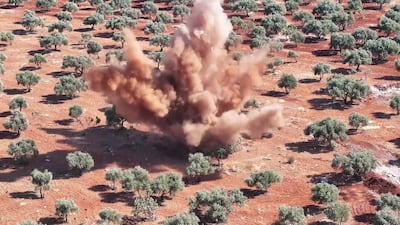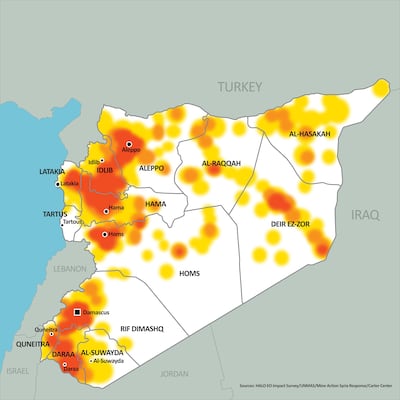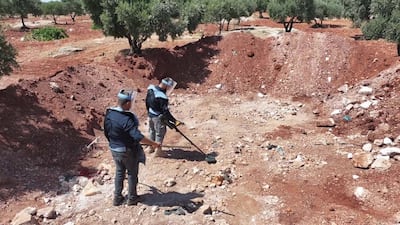Live updates: Follow the latest on Syria
Syrians are facing an unprecedented threat from millions of mines and other discarded munitions as they return to their homes, with children particularly at risk, The National has been told.
The Halo Trust, a charity with decades of experience of demining former war zones, was working in the Idlib and western Aleppo areas of Syria before the collapse of the regime of Bashar Al Assad, but has since seen a tenfold increase in the number of people reporting mines.
Syria recorded the second highest number of landmine deaths in 2023, with 933 people killed or maimed, while the year before the country had the highest number of child victims of mines.
Damian O’Brien, Halo’s Syria Programme Manager, said the current situation in the country, where hundreds of thousands of people are heading to areas that they have no idea are mined, is “unique” and he had never seen anything like it before.
The only comparison he could make was when civilians began returning home after the civil war in Sri Lanka. However, in that situation there was a government ministry handling resettlement and dealing with mines, he said.

“The numbers were nothing like what we're seeing in Syria at the moment,” Mr O’Brien told The National. “We’ve dealt with minefields and conflict situations all over the world, but seeing such a rapid change and the opening up of areas which are completely unmapped, where there is simply not enough capacity to make people aware of the problem, is unique.
“So when I say I haven't seen anything quite like it, that's what I mean. It's the sheer numbers of people and the sheer speed that this is happening that makes the risk alarming. It's really, really critical that we do all we can to make people aware of this.”
Syria's Civil Defence said six people from the same family, including three children, were killed on Saturday when a landmine blast hit their car as they were travelling in eastern Hama province.
Mr O’Brien said that there are “potentially millions of mines and other explosives” in Syria and that so far, around half of the explosives Halo has disposed of are cluster munitions.
“What's happening now is the front lines have disappeared and people are moving in very large numbers into areas which had been depopulated over many years, and in which, in many cases, have been close to the location of military positions.

“We know that there are buried mines, there are mine fields that have been in place for a long time, and these areas are not mapped. People who have not been into these areas for a long time or at all, are now moving into them.”
Particularly at risk are children playing in areas where minefields or the presence of other explosives have not been identified.
“When children are playing outside, they're going to be curious about unusual objects, even in a good way, because they want to tell their parents about it, or ask about it,” said Mr O’Brien.
Another cause of accidents is Syrians trying to sell what they think is scrap metal, but turns out to be munitions, in a bid to boost their incomes.
“Unfortunately, we've already seen accidents happening in the last few days,” he said. “This is clearly not just a traumatic experience for the people involved, but it's putting additional strain on medical services, which have been under-resourced for a long time in Syria, and are certainly going to struggle to deal with the huge influx of [injured] people that we're seeing at the moment.”
The UK-based Halo Trust was founded in 1988 and employs 13,000 deminers in more than 30 countries, including Ukraine, Afghanistan, Angola and Yemen.
The charity’s highest-profile supporter was Princess Diana, who captured global attention when she walked through a live minefield in Angola in January 1997. Prince Harry retraced her steps during a visit to Africa in 2019.
The UN says around a third of the population of Syria are affected by some form of explosives contamination, with the highest percentages in the governorates of Quneitra, Suweida, Rural Damascus, Aleppo, Idlib, Raqqa, Deir Ezzor, Deraa and Damascus.
Mouiad Alnofoly, Halo’s Syria Operations Manager, said its “phone is ringing non-stop” from refugees coming back to Syria and others who were displaced inside the country who are now making their way back home.
“But they’re all in mortal danger if they take the wrong pathway. None of them know where the landmines are hidden.”
Halo is operating an emergency Hotline in the north-west of the country, near the border with Turkey, where people can report finding discarded landmines and other suspicious explosive objects that might kill or maim them. The charity is appealing for donations to help it train thousands of Syrians in demining.
“We could easily employ 100 deminers right now, just in the area where we have already been working for the past few years,” said Mr O’Brien. “To cover the whole country, there will have to be thousands of Syrians trained and employed by Halo over many years.”


